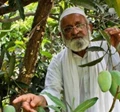
Sarojini Oram of Jharsuguda district has shown her mettle by becoming a prosperous farmer despite the gloom of growing coronavirus infections at a time when woman farmers have been largely marginalised under an unacknowledged informal agricultural workforce. Every year, this 40-year-old woman from Aitapali village in Laikera block cultivates two crops.
In her 1.5-acre plot of soil, she grows watermelon and vegetables after paddy. She has made a profit of Rs 55,000 from selling watermelon in the last two months of this year. Sarojini is a member of the Kalyani Producer Community, which includes 98 women farmers from ten Self Help Groups (SHGs) in Jharsuguda's Agriculture Production Cluster (APC).
This summer, 23 woman farmers from the producer community used better practices to grow watermelon in a cluster mode on 38 acres of soil. While woman farmers previously struggled to obtain a fair price for their crops, the problem of selling farm produce is now solved thanks to APCs that link farmers directly to the market and traders who daily lift stock from farmers in a transparent system.
“I planted watermelon after the paddy harvest. The entire crop, estimated to be about 150 quintal, has now been sold. We didn't do anything to market the produce this time. There was also a cost savings in terms of extra labor and transportation. Sarojini, who manages a four-member household, said, "Ladies finger crop is now ready to go to market."
Jharsuguda already has 47 producer sections, with 6000 women farmers divided into two blocks. The synchronized farming system produces a large quantity of high-quality crops, yielding hundreds of quintals of seasonal vegetables. With the aid of Mission, APC is being promoted in Odisha's tribal areas. Shakti is a State government initiative to improve women farmers' livelihoods through collective agriculture production and marketing through self-regulated Farmer Producer Organizations (FPOs)/ Producer Companies of 3,000 to 5,000 smallholder farmers in a given region.
Sujata R Karthikeyan, Mission Shakti Commissioner and interim Director, said the initiative, which is being introduced by the Agriculture Department by the integration of several schemes, aims to double the farm income of one lakh woman farmers in 40 backward blocks of 12 tribal-dominated districts over a four-year period by allowing women SHG members to have better control and access to farm income.
“Mission Shakti is promoting an initiative that focuses on diversifying cropping systems and developing essential infrastructure for agriculture by establishing local structures for input supplies, ensuring a better package of activities, and encouraging the implementation of non-pesticide management practices. “Through APCs, women farmers work to institutionalize the selling process, ensuring equal prices and organizing the production system, resulting in increased income,” she said.
The software will be enforced for two years in Kandhamal, Rayagada, Kalahandi, Koraput, Keonjhar, Mayurbhanj, Dhenkanal, Balangir, Nuapada, Jharsuguda, Sambalpur, and Boudh, starting on April 1, last year. So far, 363 producer groups of approximately 45,000 women SHG members have been established, and 30 producer companies have been promoted in the 12 APC districts. Apart from that, about one lakh APC members are being trained in the agriculture and livestock sectors so that they can follow better cropping practices in agriculture and livestock rearing.
Around 3000 SHGs will use Mission Shakti's credit help to increase their vegetable and livestock production. Each APC has 20 to 25 producer groups that work together to organize output, add value at the primary level, and form vibrant collectives to manage and provide various services. It aids in the synchronization of output of a particular basket of goods, resulting in a marketable surplus, as well as the development of an environment capable of providing the farmers with various services on a long-term basis.
Farmers used to have a difficult time selling their produce in both rural and city markets, and local merchants were hesitant to buy the vegetables because of low production. Though they struggled to generate significant demand for the crops in the local market, the output quantity was insufficient to satisfy the comparatively high demand in city markets.
Binod Kumar Jena, Deputy Secretary of Mission Shakti, said a comprehensive intervention was urgently needed to positively resolve the multi-layered challenges faced by farmers and improve the marketing situation. “Farmers were forced to leave their fields untended for lengthy periods of time and fly to markets to sell their products due to a lack of a proper network. The APCs have begun to properly resolve the problems and improve the situation for farmers,” he said.
The state government has also enlisted the help of a number of non-governmental organizations (NGOs) to train farmers in the most effective and long-term farming practices. Sushil Kumar Dash, Secretary of Social Education for Women's Awareness (SEWA), said, "We have been imparting training farmers on the collection and methods of cultivation of cash crops, preparation of natural pest control and organic fertiliser, shorting/grading and packing, as well as facilitation for aggregation and marketing linkage."
SEWA has been charged with promoting women farmers and producer groups in Laikera and Kolabira blocks, including the Kalyani community.












